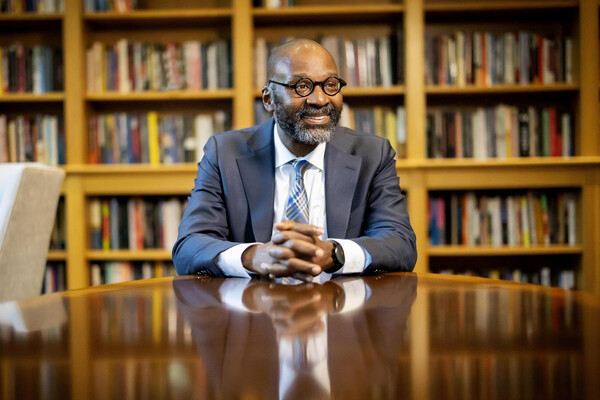
Griffin Pitt, right, works with two other student researchers to test the conductivity, total dissolved solids, salinity, and temperature of water below a sand dam in Kenya.
(Image: Courtesy of Griffin Pitt)
PHILADELPHIA — As in many large cities across the country, high school students in Philadelphia sometimes witness violence as a part of their daily lives. But, one teacher had the courage to take steps toward making a difference for his students and others.
A student-teacher at University City High School, Andrew Biros, a 24-year-old native of Yardley, Pa., noticed some of his students felt helpless about the criminal activity they see, believing that there is nothing that can be done to stop the violence.
“When I began imploring my students to identify issues within their community that they wanted to change, many expressed a significant level of apathy. Violence, drugs, crime – these are our students’ realities,” Biros says.
Worse yet, they were convinced that nothing would ever change.
“Apathy is a crippling sentiment for young people to embody, especially young people who are required to overcome adversity in order to succeed,” Biros explains.
For the past few months, 29 seniors in Biros’ classroom have been studying the link between the education gap, the level of education attainment, economic mobility and Philadelphia’s crime rates.
The students are learning to generate engaging questions through inquiry-based lessons that require thoughtful analysis of research data pertaining to their own communities.
Biros drew from institutional sources including the Urban League of Philadelphia, The New York Times, The Philadelphia Inquirer, WHYY Radio, WPVI-TV and the Philadelphia Public School Notebook to create this original curriculum.
As a Leonore Annenberg Teaching Fellow and a student at Penn’s Graduate School of Education, Biros has established a classroom culture that is grounded in an inquiry- and constructivist-based approach to social-justice education.
“Penn GSE’s inquiry approach has very much fostered in me the strength and resolve to tackle these types of issues with my students. It is a firm belief of mine that we must empower educators to come up with innovative methods of teaching and learning,” Biros says.
The inquiry method is student-centered and focuses on students asking meaningful questions to generate solutions through self-reflection and focused research. It empowers students by giving them confidence in their ability to learn, and, when using this teaching method, the educator acts less as a vehicle to distribute facts and more as a coach to facilitate thinking and problem-solving skills.
Constructivism falls under this umbrella and suggests that students generate knowledge and meaning from their own interactions and experiences.
“Ideas are more concrete when we are able to reason towards a solution ourselves,” Biros explains.
He places a high value on students’ voices, perspectives and experiences.
The point of this unique curriculum is to teach the children that, in order to access power and make change, it is essential to first understand the problems affecting one’s community.
Through the process of inquiry-based knowledge acquisition, the students are able to access that power and have their voices be heard, which can bring about change, Biros says.
“My role as a social-justice educator is to instill in my students a sense of empowerment and to show them the ways for them to access power. It is paramount that they understand that their voice matters and that, if they want to make change in their community, they need to make sure that their voice is heard by those who can assist in working towards that change,” he says.
One of the people with the ability to incorporate change is Philadelphia Mayor Michael Nutter, a Penn alum. He agreed to participate in a private discussion with Biros’ students.
Nutter will visit University City High School on Friday, March 16, to talk about the issues affecting these students and their communities, such as education, poverty and crime.
The mayor will engage in a discussion based on student-generated questions and explain how the city government is working to address these issues at their sources. He’ll also share ways in which students can become more actively engaged with accessing power and affecting change within their own communities.
“My hope is that engaging with Mayor Nutter cracks away at some of that apathetic sentiment and demonstrates that elected officials do value my students’ voice and view,” Biros says. “I want my students to understand that those in power share the desire to work towards building a safer, more prosperous community, but that, in order for that to happen, it is paramount that my students engage with elected officials and let their voice be heard.”
Other attendees will include the school’s principal, Timothy Stults; officials from the Philadelphia School District; representatives from Penn GSE; and personnel from Penn’s Netter Center for Community Partnerships.
Biros will earn his M.S.Ed. in secondary teacher education in May. In 2010, he earned his B.A. in political science from Penn.
As an undergraduate, he worked closely with Penn’s Fels Institute of Government and was a part of the team that released the first edition of the Fels Promising Practices report on the government’s use of social media. He also helped to organize the inaugural Interdisciplinary Public Policy Challenge as a part of an independent study.

Griffin Pitt, right, works with two other student researchers to test the conductivity, total dissolved solids, salinity, and temperature of water below a sand dam in Kenya.
(Image: Courtesy of Griffin Pitt)

Image: Andriy Onufriyenko via Getty Images

nocred

Provost John L. Jackson Jr.
nocred